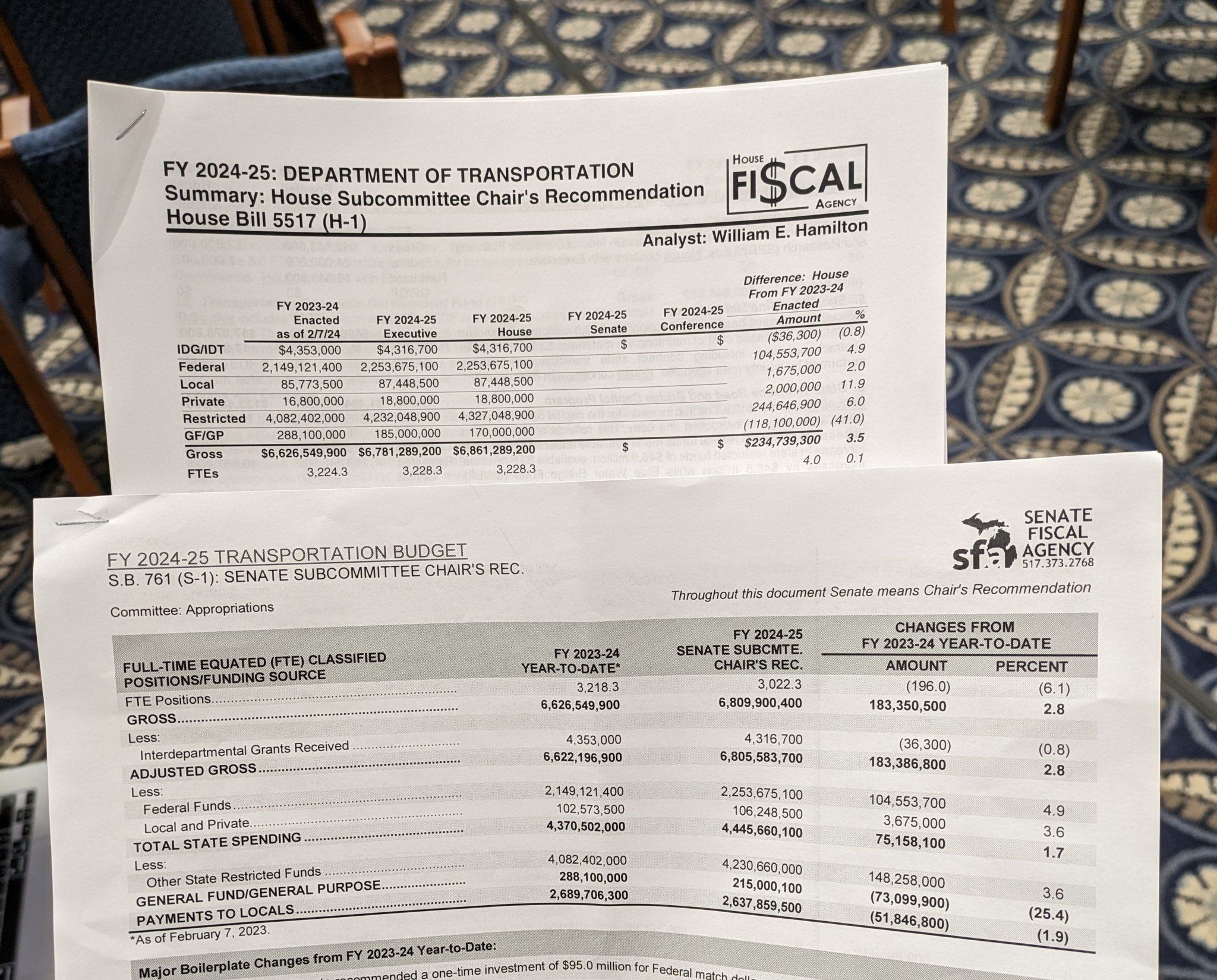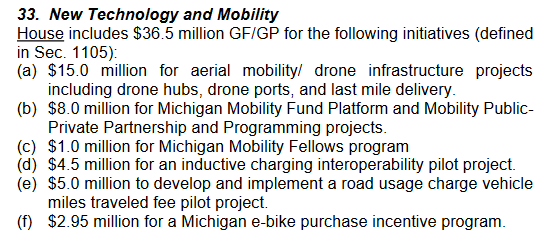102nd Legislature, Week 49: Senate and House Budgets, Local and Federal Wins

Lansing achievement unlocked: Literally sprint across the Capitol lawn to attend two overlapping House and Senate subcommittee meetings
The Senate and House Proposed Budgets
On Wednesday, April 24th, the House and Senate transportation appropriations subcommittees presented each chamber’s proposed FY2024-25 state budget .
The Executive budget recommendation proposed a $5M sustained Local Bus Operations (LBO) increase. As previously reported, due to the nonrenewal of one-time ARPA funds allocated in last year’s budget, this effectively amounts to a $40M decrease in LBO dollars compared to the current FY2023-24 budget.
In response, the Senate recommends a $45M sustained LBO increase, while the House recommends a $12.5M sustained increase in addition to a $25M one-time general fund increase for a total increase of $37.5M. The House also includes $2.95M for an e-bike purchase incentive program as well as a directive for MDOT to study road diets on “nonfreeway state trunkline highways.”

The Senate Fiscal Agency and the House Fiscal Agency have each published budget summary documents.
👋 Our ask: Redirect discretional grant funding to LBO
The Executive budget calls for $30M in “Transit Innovation Grants.” At the March 13th House Appropriations subcommittee meeting , officials from multiple transit providers as well as the Michigan Public Transit Association spoke to the urgency of fully funding LBO before considering any other one-time strategies. The proposed Senate budget lowers this amount to $20M.
Others at TRU and I urge the legislature to take this further: Redirect additional discretional grant funds to standard operations funding , and then further increase sustained LBO dollars if possible. The recommended Senate budget still only maintains the current LBO funding level and does not substantially increase it, which is necessary if we wish to support transportation expansion plans in the coming years. Rep. Morgan (D-Ann Arbor) is working on introducing a bill to this effect.
The conference committee process will start within the next few weeks, with a final budget deadline of June 30th. If you haven’t yet contacted your legislators, now is the time. You can use TRU’s form , though I strongly encourage you to reach out personally and consider scheduling a meeting with the offices of your Senator and Representative. Personal accounts have the strongest impact on lawmakers.
Vulnerable Roadway User Bill Package Testimony
On Tuesday, April 23rd, Rep. Rogers (D-Kalamazoo) and Rep. Schuette (R-Midland) presented HB 5223 and HB 5224 , respectively, to the House Committee on Transportation, Mobility, and Infrastructure . The two bills, in conjunction with SB 618, would increase penalties for motorists who injure pedestrians, mobility device users, people riding bikes or e-bikes, people using skates or skateboards, people on horseback, or people otherwise using a public roadway outside of a vehicle as legally permitted.
The full testimony from Rep. Rogers and stakeholders is available on House TV .
My personal opinion on these bills is mostly neutral. While they certainly won’t hurt, it’s important to keep in mind: Punitive enforcement is not a substitute for preventive action. We should also be prioritizing efforts to understand where and why conflicts between motorists and other roadway users occur, and design our streets and roadways to keep ALL users safe, not just those behind the wheel of a private vehicle. As has become a common refrain on this blog: A culture change within MDOT is required.
To put it bluntly: As a transit user and e-bike owner who regularly shares the road with cars, I won’t care about what sort of punishment a motorist gets when I’m dead. I’d like to, y’know, not die. Design our streets so those of us outside an expensive rolling steel cage can use them without getting badly hurt or killed.
Federal and Local Level Wins
As the legislature returned from spring recess, we saw a lot of good news from above and below Lansing.
FTA announces full FY2024 federal funding
On Thursday, April 4th, following the final passage of the federal Transportation, Housing, and Urban Development budget in early March, the Biden-Harris Administration announced a $20.5B increase in formula funding for transit providers . Michigan will receive $194.3M from these funds. Per the release, these funds will help maintain and expand transit operations as well as assist with planning new transit corridors.
Oakland County supports increased LBO funding
At the April 24th Board of Commissioners meeting, a resolution supporting “an increase in the Governor’s Local Bus Operating FY 2025 Budget” was unanimously adopted.
SMART Route 492 Enters Service
Route 492, Rochester Road, restores fixed-route transit to Rochester and Rochester Hills for the first time in 30 years.
Opening date for the Jason Hargrove Transit Center confirmed
DDOT has officially announced that the new State Fair Transit Center, now to be called the Jason Hargrove Transit Center in memory of an operator who passed away at the beginning of the pandemic in 2020, will open on Saturday, May 11th at 3:00am. The temporary parking lot platform will shut down at this time.
The City of Detroit announces increased DDOT funding
Mayor Duggan’s FY2024 city budget includes a $21.6M overall increase in funding for DDOT , including 117 new driver positions. As part of this increase, Council Members Fred Durhal III (District 7) and Mary Waters (At-Large) secured $150K in funding for accessibility upgrades to 150 DDOT stops across Detroit . This addition was made possible through the “Fund Disabled Detroiters” advocate-led budget recommendation, a joint effort between Detroit Disability Power (DDP) , Warriors on Wheels (WOW) , and is the metro accessible? (ITMA) .
ITMA is a volunteer transit accessibility mapping project led by disabled transit riders in Metro Detroit. I’m a regular contributor to this effort.